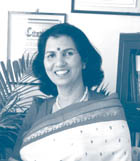TREAT Asia Site Profile: Y.R. Gaitonde Centre for AIDS Research and Education (YRG CARE), Chennai, India
October 2003—In 1985, few in India believed that HIV/AIDS had infiltrated the country’s population. But Dr. Suniti Solomon decided to challenge the conventional wisdom. Working in a government hospital, she led a group of doctors in testing 200 blood samples taken from sex workers and other “high-risk” populations. The team found six HIV-positive cases — the country’s first documented infections. At the end of 2001, 3.97 million adults and children in India were living with HIV/AIDS, according to UNAIDS. In July 2003, Prime Minister Atal Behari Vajpayee announced that the number had surged to 4.58 million. India now threatens to surpass South Africa as the country with the most HIV/AIDS cases in the world.

Dr. Suniti Solomon |
India’s AIDS epidemic has been fueled by low perceptions of risk, lack of counseling and testing services, disease-associated stigma and discrimination, lack of properly trained health care professionals, limited access to treatment, and ill-defined treatment management regimes. To address these daunting challenges, Dr. Solomon founded the Y.R. Gaitonde Center for AIDS Research and Education (YRG CARE) in Chennai, capital of Tamil Nadu, in 1993.
“In my center, we started with prevention,” said Dr. Solomon. “When I talked to young people, they came up to me and said, ‘I want to be counseled.’ When I counseled them, I found they needed testing. And when I tested them and found them positive, where could I send them? So we moved into care.”
YRG CARE now serves as a model system for HIV/AIDS services in Asia and the Pacific. It has grown in a decade from a three-person operation that offered basic testing and information services, to a premier medical and behavioral research center with a staff of more than 100 providing health care for more than 5,500 patients living with HIV. The organization aims to provide care, support, and education for people living with HIV/AIDS, to prevent new infections, and to ensure that patients and their families are treated with dignity.
The Chennai facility offers inpatient and outpatient care, treatment for opportunistic infections, antiretroviral therapy (ART), psychosocial counseling for individuals, couples and families, nutrition counseling, and voluntary counseling and testing. Through an extensive referral network and a consortium of consultants, staff can refer clients to other groups for additional support services. YRG CARE reputation as a source of high-quality, confidential care attracts clients throughout India, and from neighboring countries as well.
With the reduction in the cost of ART drugs over the last few years, approximately 29 percent of YRG CARE patients who require highly active antiretroviral therapy (HAART) are able to afford it. Besides monitoring CD4 and viral load levels, the counseling team also provides patients with financial and adherence counseling. The high cost of the laboratory tests underscores the need for more affordable surrogate markers for the regular monitoring of patients’ responses to ART. YRG CARE’s state-of-the-art infectious diseases laboratory is currently validating such low-cost techniques.
YRG CARE collaborates with Brown, Tufts, and Johns Hopkins Universities in the United States in carrying out clinical, epidemiological and behavioral research projects. It is also an HPTN, ACTG and NIMH site of the U.S. National Institutes of Health. More than 50 original articles have been published in peer-reviewed medical journals based on studies undertaken at YRG CARE.
Dr. Solomon and her colleague at YRG CARE, Dr. N. Kumarasamy, Chief Medical Officer and Clinical Researcher (see page 3), have been active participants in TREAT Asia since its inception. Dr. Solomon is currently co-chair of TREAT Asia’s communications and fund raising committee and Dr. Kumarasamy is co-chair of the scientific committee.